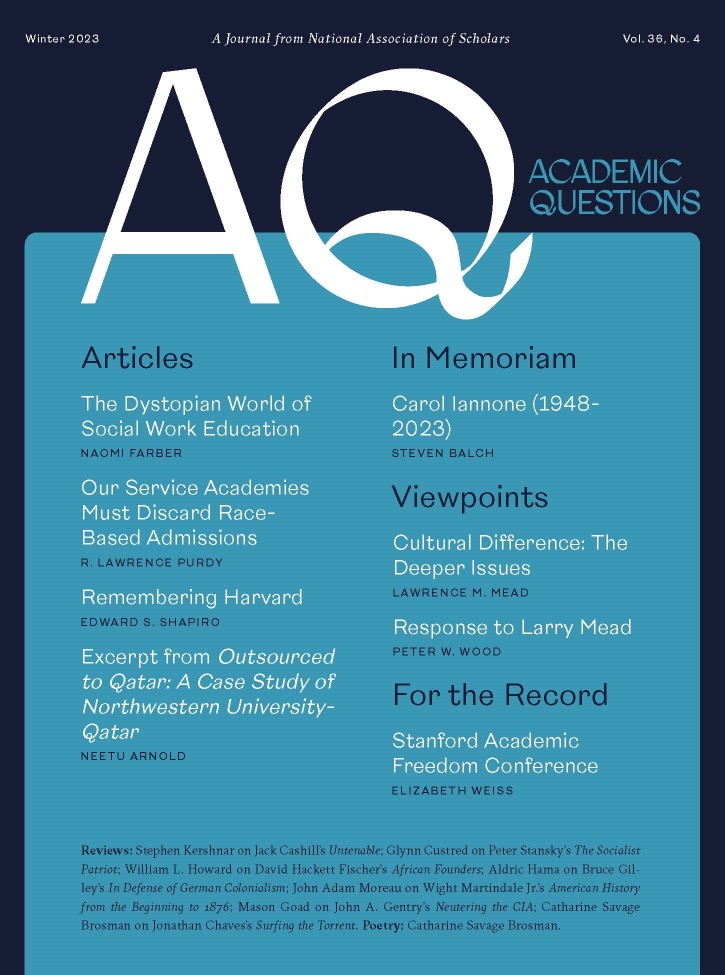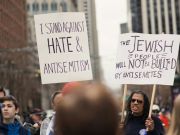Editor's Note: It is with great sadness that we acknowledge the passing of our esteemed colleague, Carol Iannone. Readers of Academic Questions know that Carol was very much the heart and soul of this publication. She introduced every issue to readers with passion, style, and understanding not only of the topics covered in these pages, but also of how they relate to the intellectual life of the nation. Like so many members of the NAS, Carol was horrified by the capture of our universities by what she rightly saw as an authoritarian rejection of reason, humanity, open debate, universalism, and objectivity. Accordingly, she infused her writing with a love of art, literature, and beauty, and with a fierce belief in the writer’s obligation to honestly search for truth. Carol’s contribution to Academic Questions cannot be replaced. But she has left the publication with the indelible marks of her rich body of work, strength of character, and basic human kindness.
Yesterday [Jan. 3, 2024] the National Association of Scholars (NAS) learned that Carol Iannone had passed away in her Manhattan apartment sometime during the holiday season. It’s heartbreaking news. She was that rare chimera, the hardened idealist, coupling an innocence ever shocked by the world as it is, to a tough-minded tenacity that never relented in fighting back.
Carol’s family was the NAS. From its 1982 inception to her last day on Earth she served it in one or another important capacity: founding Vice President, board member, and, under various titles, a senior member of the Academic Questions editorial team. When present at a meeting, she was ever the conscience figure, registering wide-eyed incredulity at any inclination to soften a response or give some academic miscreant the benefit of the doubt. Always ladylike and demure, she was nonetheless an enduring pillar of moral strength.
She first came to my attention through the articles she regularly contributed to Commentary magazine, making her something of a celebrity in the small world of East Coast conservatism. Her beat was feminism, and its transformation from a claim to equal rights into an all-out assault on received morality and social common sense. Her chief vehicle was literary criticism, assaying and flaying ideologically driven writers who insisted on interpreting the world, or past authorial greats, according to the strictures of a perverse political agenda. And for this, she paid a sizable professional and human price.
Brought to the Gallatin Division of New York University to advance its mission of classical education for non-traditional students, she quickly fell afoul of faculty determined to subvert it. Eventually, she was thrust out of it altogether as, like many other university programs, it gradually regressed to the academic mean. During its heyday, the Gallatin Division was headed by the NAS’s founding chairman, and it was through his auspices and Carol’s literary mentor, the critic Peter Shaw, that I was introduced to Carol personally.
Carol had a stomach for fights and, when it was solely up to her, always gave much more than she got. I can remember her routing detractors with deftly delivered sarcasm at a lecture booked for her, through the agency of our Pennsylvania affiliate, on the University of Pittsburgh’s campus.
Yet producing a comparable effect was beyond her individual powers when she became embroiled in her career’s most painful episode, her 1991 nomination to the board of the National Endowment for the Humanities (NEH). Lynne Cheney, the first big-gun public personality to put the politicization of academe in her sights, was then the NEH’s chairman. Cheney was naturally loathed by the Modern Language Association and all its minions, who decided they would use Carol’s nomination as a means of attacking her NEH leadership.
Carol, though a first-rate intellectual with a long stream of astute and learned essays on literature and the arts, hadn’t compiled the standard rap sheet of jargon-laced “peer-reviewed” articles that, by then, passed for cutting-edge scholarship. Foreseeing this objection, the Bush Administration had put her up for one of the “public seats” set aside for those representing the broader public interest in the humanities rather than simply the university’s. This didn’t stop her detractors for a moment. Following the topsy-turvey rules of postmodernism, they claimed it was Cheney and Iannone who were injecting politics into what had hitherto been the pristine doings of the endowment. “Iannone Smoke, Cheney Fire” railed a New York Times editorial.
In the Senate, the fight against was led by Edward Kennedy, a noble champion of feminism and women. For many weeks, Carol had to endure a public roasting not only by academe’s literary establishment, but by a gang of politicians whose experience with novels didn’t extend beyond Jacqueline Suzann, and that only through the pillow talk of their wives and girlfriends. Carol and Lynne Cheney fought the fight to the finish, not withdrawing the nomination but letting it come to a vote, that was lost in committee on a party line ballot. The experience, which might easily have crushed others, left Carol unbowed—though it must have been hell.
Carol, now teaching at Iona College, a small Catholic institution just north of New York City, continued full service at the NAS. Although deeply involved in our organization’s activities, her private life—Carol was unmarried—was always something of a mystery to the rest of us. Some of it became visible when her role in the life of conservative writer Larry Auster emerged during his protracted and terminal bout with cancer. She stood beside him to the end as a loving caregiver and comforter, providing him with solace that he had no close family to give. Though I suspect that there were some differences in their political positions, his death was another deep wound that she carried into her final years.
Born a Catholic, Carol, after an early adult life crisis, became a Christian Scientist, sometimes coming to Princeton not because the NAS office was there, but because the town also hosted a Christian Science retreat. This meant she was deeply spiritual, believing humans to be soulfully capable of rising above material and bodily limitations. Accordingly, she firmly rejected material explanations of the human situation. She thought, for example, that Darwinism and religion were irreconcilably at odds. I’m sure she believed in immortality for us all, bettered for having shuffled off the mortal coil. I hope something like that rapture is now in her possession. What I know is that we have experienced an irremediable loss.
Steve Balch, Founding President, National Association of Scholars.
Photo by irisphoto1 on Adobe Stock














